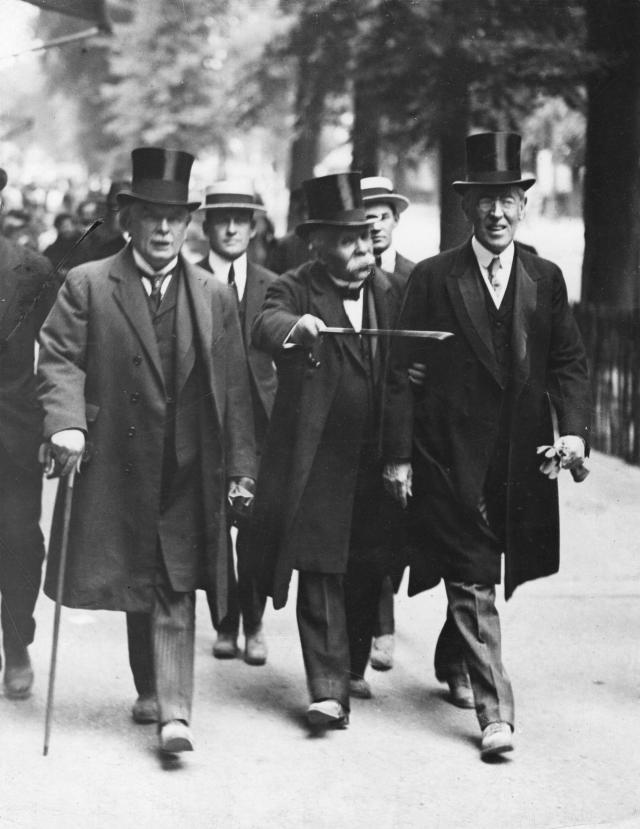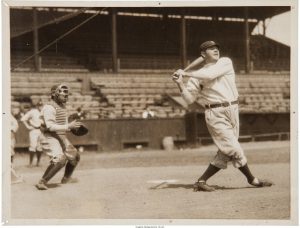Catastrophic war is something most people loathe and fear, and World War I brought exactly that, with over 38 million causalities, including approximately 17-20 million dead. There were many efforts to end the war, and various strategies to crush each side’s enemies. However, few at the time looked past just ending the war, let alone actually creating stable, sustainable peace. Woodrow Wilson was not one of those people. Wilson enumerated a plan for peace after the war in something titled Fourteen Points, which he gave as an address to the US Congress on January 8, 1918.1
To talk about the Fourteen Points, we must first discuss Wilson himself. Ranked among scholars as one of the nation’s best Presidents, Wilson was a Democrat and served as President through all of World War I and then some. He won the first term of his Presidency to some extent with a progressive plan called the New Freedom, in which he planned to eliminate industrial and financial monopolies, and he promised to reduce taxes on foreign imports. As the war began in Europe in 1914, Wilson was originally against U.S. involvement, but eventually he came to support the Allied Powers of Great Britain, France, and Russia because of German resumption of unrestricted submarine warfare.2 All of this suggests that Wilson understood the importance of being behind what the American people believed, but also strong enough to lead the nation using his own judgment, and not be a push-over. This is exactly what he did with his Fourteen Points, and the effects of it were astounding, and is a prominent reason for why he is regarded as one of the nation’s best Presidents.

The Fourteen Points served as a plan to create world-wide peace following the end of the Great War. Wilson argued for the world to be “made fit and safe to live in.” It would be “the programme of the world’s peace” as outlined in his Fourteen Points. Points 1-5 depicted Wilson’s vision of a world in which each country was independent and allowed to pursue its own goals safe from the aggression of others. The reason Wilson wanted this to happen was because, according to him, the European nations had caused this conflict because of their imperialist designs that had caused them to take their competition into their colonies and onto the high seas. Clashes in the colonies had caused them to engage in an arms race and to enter into secret alliances that committed each nation to wage war even when it was not in their national interests to do so.3 Wilson hoped to stop the chain reaction of events, like those from the summer of 1914, from occurring again by stating that countries should tend to their own matters, and that there should be no limitations on any country’s navigation of the seas or their pursuit of commerce, which was the upshot of “open covenants of peace, openly arrived at” and “absolute freedom of navigation upon the seas.” Point 4, the reduction of armaments, was especially significant for Wilson because of the link between massive build up for war and the compelling sense to use those armaments, even for minor conflicts. Wilson believed that all nations’ armaments should be reduced “to the lowest point consistent with domestic safety.”3
Points 6-13 focused on individual nations and what would happen to them, with the startling claim that their true success would be measured by “the acid test of their good will” on how Russia would be treated. Wilson felt that each nation should move its troops back to its original borders, and that the collapsing nations should be helped.3 This idea was in contrast to what the European allies wanted after the war. They felt the need to continue their military occupation of German territory, partly out of fear that the German’s would resume the war, and partly because they too were so broken by the war that they needed to claim German reparations by force if necessary. This caused significant problems in creating the ensuing peace treaties, particularly the Treaty of Versailles.6
The last of the Fourteen Points was the most important to Wilson, and had the greatest promise for him. In his fourteenth point, Wilson called for the creation of “a general association of nations” or a League of Nations, which would be an alliance of all the world powers, created with the intent of stopping future global wars and regional conflicts, and instead would create the conditions for sustained peace. Although the idea of such a League predated Wilson, Wilson was the strongest advocate for it in 1918. It is possible that without him, or without his Fourteen Points, the League of Nations might have never have formed.7
The legacy of Wilson’s Fourteen Points are the League of Nations’ creation, the facilitating of various treaties that brought World War I to an end, and a basis for how world-wide peace should be handled by attempting to reduce weapons and limit imperialism. However, the League of Nations ultimately broke down with Japan and Germany leaving the League in the 1930s, and collapsing completely with the onset of World War II. Wilson’s main goal of his Fourteen Points was to create this League of Nations that would usher in worldwide peace. Wilson received a stroke in 1919, due partly because of his heartbreak that his own Congress refused to ratify and join his League of Nations. Other elements of his Fourteen Points were also abandoned or ignored by Great Britain and France, particularly his desire to see the world decolonized. In other words, his ideas about world peace were at best too early for a world not ready for the kind of peace and cooperation that he envisioned. Also, when we analyze the speech that Wilson gave to Congress, we see that Wilson believed in the idea that peoples of the world should be allowed to determine their own destinies, something that later became known as the self-determination of peoples. Because this principle was inconsistently followed by the Allies, enabling the Czechs and the Poles to form their own nations but not the Germans with the Austrians to form their own nation, this inconsistency contributed in a large part to the chain-reaction that led to the National-Socialist party forming and coming to power in Germany and its subsequent ambitions to right the wrongs of the Treaty of Versailles. It also created a tension between the idealism of Wilson and the real-world aspirations of the British and French allies to maintain their empires.1
- Gale Encyclopedia of U.S. History: Government and Politics. Vol 2, 2008, s.v. “The Progressive Era (1890-1930).” ↵
- Gale Encyclopedia of U.S. History: Government and Politics. Vol 2, 2008, s.v. “The Progressive Era (1890-1930).” ↵
- Encyclopedia of Western Colonialism since 1450. Vol 3, 2007, s.v. “Fourteen Points.” ↵
- Encyclopedia of Western Colonialism since 1450. Vol 3, 2007, s.v. “Fourteen Points.” ↵
- Encyclopedia of Western Colonialism since 1450. Vol 3, 2007, s.v. “Fourteen Points.” ↵
- Gale Encyclopedia of U.S. History: War. Vol 1, 2008, s.v. “World War I (1914-1919).” ↵
- Encyclopedia of Western Colonialism since 1450. Vol 3, 2007, s.v. “Fourteen Points;” Gale Encyclopedia of U.S. History: War. Vol 1, 2008, s.v. “World War I (1914-1919).” ↵
- Gale Encyclopedia of U.S. History: Government and Politics. Vol 2, 2008, s.v. “The Progressive Era (1890-1930).” ↵



58 comments
Griffin Palmer
This article did great at pointing out the issues the United States had after ww1 and how Woodrow Wilson would be of great help in solving these issues through his Fourteen Points. I agreed with Woodrow’s opinions on foreign policy and interactions with other countries after World War 1. It really helps to show Woodrow’s significance in US history and how he would help in allowing America to thrive.
Isabella Lopez
What a information quick read! 38 million casualties is a crazy number. Wilson was very sure of himself. To think an American telling Europe how to run things is very comical. I think that is a very American ideology though. He probably didn’t need 14 points. Some of his ideas did have good intent but they were to simple and ignored the fact that humans have their own pride. Plus who would have paid in the end.
Jacob Anthony Ayala
The fourteen points. I never would have thought this would have been so interesting to read. Wilson has never been one of my favorite presidents. But some of these fourteen points seem to be good and very forward-thinking for the time period. I really like the league of nations point. Even though it didn’t happen during Wilson’s presidency it was still a fantastic thought.
Lyle Ballesteros
Really good article. Wilson is an interesting president as their are a lot of good ideas and ones that you could easily support today. Things like world peace, decolonizing, and a united leage of nations are all things most people would want but at the time nations and leaders were very angry and bitter, especially towards Germany whcih turned out to be a mistake and leading towards World War II. They probably should have listened and implement his points but ended up being blinded by their seek of revenge and someone to take the blame.
Alexandra Ballard
I almost laughed a bit when I saw that Wilson had outlined his ideas for individual countries. I think it’s very American to believe that his ideas could practically rebuild all of Europe. I don’t doubt a lot of thought and good intent went behind his points, but I don’t know if it was his place. I also can’t help but see the contradiction of his self-determination of people’s ideas, as you mentioned. I feel bad for the guy! He wanted to be president of the world.
Maria Luevano
This was a great article and the author did a splendid job explaining Woodrow Wilsons Fourteen Points and what it meant. I do believe Wilson had a good idea when he came up with the Fourteen Points and I do believe it would have worked to some degree, but unfortunately, I do believe the world was far too imperialistic and not comfortable with such radical ideas at the time to follow through with the Fourteen Points. ALthough, after WW1 it is clear that there needed to be some improvement and evaluation of the way the world was functioning because there were too many human lives lost and at stake, if the nations continued their old ways.
Hunter Stiles
First of all, huge congrats on the publication of such a well written article!
It was quite fascinating to read this article. It discussed the fourteen ideas in detail, as well as what Wilson intended when he put them into practice. By putting these 14 things into practice and working toward peace, Woodrow Wilson clearly had the best of intentions. Wilson made some good comments, and I agree with them. His proposal for a league of countries and disarmament may have been more successful and possibly avoided World War Two if it had been properly carried out. Sadly, Wilson’s ideals were not shared by Britain and France, who want retribution. Wilson was primarily concerned with preventing another war, while Britain and France were more concerned with reestablishing their empires.
This was an article that allowed me to better understand a topic that has been highlighted a few times through out my course of education. This was well written and addressed. Very good job!
Danielle Sanchez
Twenty million people dead due to the first World War was an introduction that caught my attention. Wilson created a plan for peace after the war in Fourteen Points which was given as an address to Congress. The Fourteen points served as a plan to create world-wide peace to end the great war. Wilson argued for the world to be made fit and sage to live in.
Guiliana Devora
I liked how this article summed up the points for us and made it to where readers would be able to understand Wilson’s points and get the basics of them. I am agree with all of the points that Wilson made on trying to be able to achieve world peace, and the fact that he was one of the first to advocate for a league of nations shows just how smart he was in trying to actually accomplish his goals.
Olivia Gray
Really good article! It was a very smooth read. I have not learned much about Woodrow Wilson other than he was president and came up with the “New Freedom” and favored small governments. I was not aware that the 14 points were the reason the war had ended. I like how Wilson said in his speech “peoples of the world should be allowed to determine their own destinies.” This shows that he truly cared for the people.